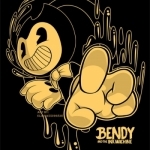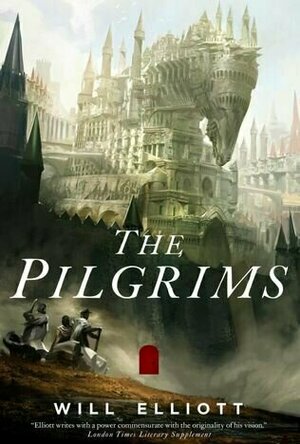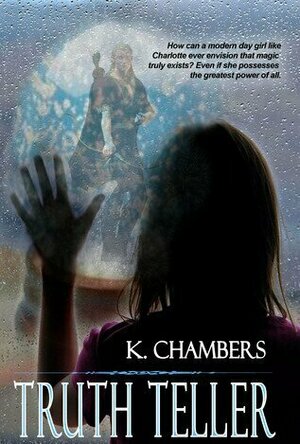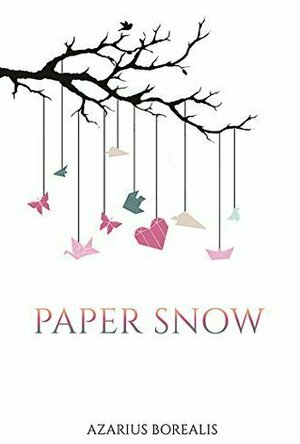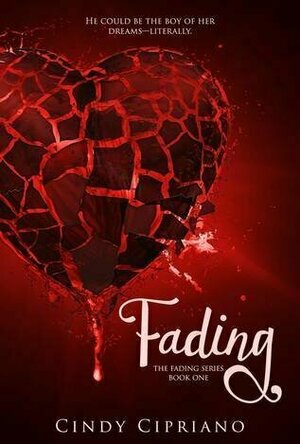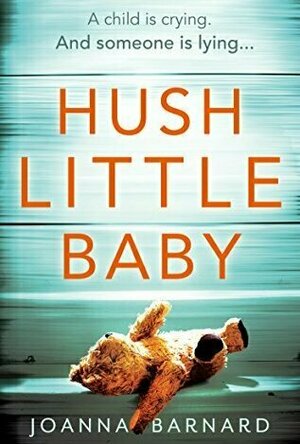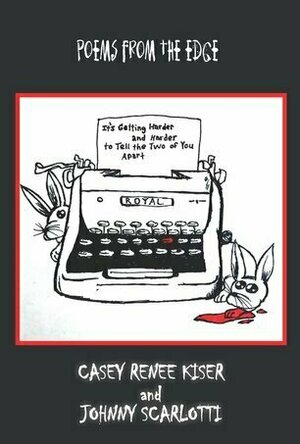Search
Search results
Gareth von Kallenbach (980 KP) rated Bendy and the Ink Machine in Video Games
Aug 14, 2019
Set in the long abandoned Joey Drew Studios, Bendy and the Ink Machine (“BatIM”) is a survival horror game with an aesthetic of classic cartoons of yesteryear. As Henry, you set about to revisit your old workshop after receiving a mysterious letter from your past employer. When Henry arrives at the shop, he finds duhn duhn duhn the Ink Machine. The Ink Machine is a rather large device that gushes out black ink and has mystical qualities. Henry then becomes trapped in the maze-like studio, though he soon finds that he is not alone. Like a creep in the shadows, Bendy, the Mickey Mouse of the Joey Drew Studios universe, is lurking. BatIM blends puzzle solving with first-person gameplay as you adventure through a studio brimming with horrors. The art style is reminiscent of Steamboat Willie, with a macabre twist. Instead of happy go-lucky little animals, we are bombarded with the sinister grin of Bendy as he emerges from the shadows.
Similar to other games with an episodic structure (e.g.: Alan Wake and Life is Strange), BatIM uses short levels to advance the story line in some intriguing ways. Love of Exploration will be your saving grace in this game, as each area requires some in order to advance to the next. The game is not fast-paced. On the contrary, it’s meant to be a slow experience for the player with sparse combat scenarios present only to add a brief moment of action. Your actions as Henry are very limited, as is his speed. With 5 chapters, the gameplay time is at just about hours, and the game uses every minute to pull you deeper into the dark world it has created.
I reviewed BatIM for the Nintendo Switch and found that the game was somewhat held back by the platform’s technical limitations. The biggest drawback I found was that textures would often blur and have jagged edges, with the shaky 30FPS frame rate just feeding fuel to this fire. This is a detriment to gaming’s purpose in keeping the players immersed in the environment. BatIM is meant to be tense, but I often found myself dispelled of the illusion due to blurry visuals and dropped frames. With a game designed so well, how unfortunate that this be its biggest flaw. Maybe this can be patched out, but we can only hope at this point.
BatIM developer, theMeatly Games, may have taken inspiration from Five Nights at Freddy’s as the gameplay and overall genre of the games are quite similar. The world is conceptualized using objects such as books and tapes found within the game instead of long cut scenes that can tend to take you out of the moment rather than add to it in games like these. As you delve deeper into the oubliette of a workshop, you’ll find that the gameplay is perfectly paired with the game’s sick and twisted visuals, proving that BatIM delivers on every level.
Bendy and the Ink Machine is available now on all major platforms.
Similar to other games with an episodic structure (e.g.: Alan Wake and Life is Strange), BatIM uses short levels to advance the story line in some intriguing ways. Love of Exploration will be your saving grace in this game, as each area requires some in order to advance to the next. The game is not fast-paced. On the contrary, it’s meant to be a slow experience for the player with sparse combat scenarios present only to add a brief moment of action. Your actions as Henry are very limited, as is his speed. With 5 chapters, the gameplay time is at just about hours, and the game uses every minute to pull you deeper into the dark world it has created.
I reviewed BatIM for the Nintendo Switch and found that the game was somewhat held back by the platform’s technical limitations. The biggest drawback I found was that textures would often blur and have jagged edges, with the shaky 30FPS frame rate just feeding fuel to this fire. This is a detriment to gaming’s purpose in keeping the players immersed in the environment. BatIM is meant to be tense, but I often found myself dispelled of the illusion due to blurry visuals and dropped frames. With a game designed so well, how unfortunate that this be its biggest flaw. Maybe this can be patched out, but we can only hope at this point.
BatIM developer, theMeatly Games, may have taken inspiration from Five Nights at Freddy’s as the gameplay and overall genre of the games are quite similar. The world is conceptualized using objects such as books and tapes found within the game instead of long cut scenes that can tend to take you out of the moment rather than add to it in games like these. As you delve deeper into the oubliette of a workshop, you’ll find that the gameplay is perfectly paired with the game’s sick and twisted visuals, proving that BatIM delivers on every level.
Bendy and the Ink Machine is available now on all major platforms.
Phil Leader (619 KP) rated The Pilgrims (Pendulum #1) in Books
Nov 25, 2019
The Pilgrims is the second book by Will Elliott and the first in the Pendulum trilogy. It follows Eric (a down on his luck journalist) and Case (an old vagrant that Eric befriends) who discover that a small door under a bridge leads to a different world.
The story follows them as they travel across this new land of Levaal and encounters various inhabitants - human and other races. There has been a war simmering between The Castle - ruled by the (not to beat about the bush) insane Vous - and a coalition of still-free cities governed by their respective mayors. Eric and Case arrive just as the war is about to become a full battle, and it's clear that this is not a coincidence.
I'm always wary of fantasy books where people cross from this world into the world of the writer's imagination, it always seems like a bit of a fanboy's wet dream and sometimes it isn't handled well and leaves a lot of holes. Elliott does adequately well in addressing these - Eric (at least) does not cross by accident, the magic that brings them to the world allows them to speak the correct language and so on. Elliott also wisely immediately plunges the antagonists into action, revealing the wonders of Levaal rather than letting them frolic on some untouched green hillside.
The other notable deviation from this being any sort of wish fulfillment fantasy is that Levaal actually isn't very.... nice. Danger, intrigue and double dealing abound. Vous could be nominally labelled as the 'bad guy' but it's clearly described that he is doing what are bad things for what he considers the right reasons. There are no 'dark lords' here and by the same token the 'good guys' really aren't particularly good.
Eric and Case are not spared from this. Neither is a paragon of virtue, Eric has some distinct character flaws, which are made very clear to him by other characters and perhaps at least some of the arc of the trilogy will be Eric becoming a 'better' person. Case has served time in prison for murder and is an alcoholic, the latter fact makes him behave erratically at best.
The inhabitants of Levaal do not deviate far from stock fantasy races, but all are unique and the world does seem to fit together and work quite well as a 'real' place, I did like the mechanism of how the magic worked and its limitations. Elliott has really put some thought into this.
The writing is hard to find fault with; the descriptive passages have real atmosphere, the dialogue is sharp and always in keeping with the characters, which in themselves are complex and nobody is represented as a cipher or standard trope. The story is engaging and moves at a terrific pace, covering a lot of ground (both metaphorically and across Levaal).
The ending is a real cliff hanger with a sting in the tail and it will be interesting to see where the story goes in the next volume, Shadow.
Highly recommended, though not for younger readers due to explicit sexual references.
The story follows them as they travel across this new land of Levaal and encounters various inhabitants - human and other races. There has been a war simmering between The Castle - ruled by the (not to beat about the bush) insane Vous - and a coalition of still-free cities governed by their respective mayors. Eric and Case arrive just as the war is about to become a full battle, and it's clear that this is not a coincidence.
I'm always wary of fantasy books where people cross from this world into the world of the writer's imagination, it always seems like a bit of a fanboy's wet dream and sometimes it isn't handled well and leaves a lot of holes. Elliott does adequately well in addressing these - Eric (at least) does not cross by accident, the magic that brings them to the world allows them to speak the correct language and so on. Elliott also wisely immediately plunges the antagonists into action, revealing the wonders of Levaal rather than letting them frolic on some untouched green hillside.
The other notable deviation from this being any sort of wish fulfillment fantasy is that Levaal actually isn't very.... nice. Danger, intrigue and double dealing abound. Vous could be nominally labelled as the 'bad guy' but it's clearly described that he is doing what are bad things for what he considers the right reasons. There are no 'dark lords' here and by the same token the 'good guys' really aren't particularly good.
Eric and Case are not spared from this. Neither is a paragon of virtue, Eric has some distinct character flaws, which are made very clear to him by other characters and perhaps at least some of the arc of the trilogy will be Eric becoming a 'better' person. Case has served time in prison for murder and is an alcoholic, the latter fact makes him behave erratically at best.
The inhabitants of Levaal do not deviate far from stock fantasy races, but all are unique and the world does seem to fit together and work quite well as a 'real' place, I did like the mechanism of how the magic worked and its limitations. Elliott has really put some thought into this.
The writing is hard to find fault with; the descriptive passages have real atmosphere, the dialogue is sharp and always in keeping with the characters, which in themselves are complex and nobody is represented as a cipher or standard trope. The story is engaging and moves at a terrific pace, covering a lot of ground (both metaphorically and across Levaal).
The ending is a real cliff hanger with a sting in the tail and it will be interesting to see where the story goes in the next volume, Shadow.
Highly recommended, though not for younger readers due to explicit sexual references.
Phil Leader (619 KP) rated Truth Teller (The Truth Teller Series #1) in Books
Nov 27, 2019
Remember when you were 6 or 7 and first read The Lion The Witch And The Wardrobe? Well I do and the whole 'you could go to another realm and be special' thing was such a key to drawing me into fantasy. And at that age the whole talking animals thing was entirely in keeping with my imagination.
But if you are a little older, nicely into double figures of age. Although the escape to another realm is still a terrific idea, the talking animals are just not going to fit anymore. What you need is a bit of action and likeable characters who are realistic while still being elves and dwarves. But if Narnia is no longer a viable destination at that age, where is?
Truth Teller fits the bill perfectly. Charlotte is a normal ten year old girl on holiday with her family. While wandering around the shops of the local town she finds a strange curio shop. She finds one of the objects in the shop interesting - a sort of snow globe without any snow. The odd little man who runs the shop gives it to her for free, but warns her that the price she pays might not be of the monetary kind.
That night while studying the globe she feels if she is falling into it and finds herself in a cold woodland, where she meets Elder. Very soon it is apparent to her that she is not anywhere near where she should be, if she is even on Earth at all anymore. Elder is an elf and he and his family try to help Charlotte find her way back home. Meanwhile dark forces are stirring and rumours of invasion are spreading.
Chambers has set out to provide an entry point into fantasy for younger (female) readers and has done a sterling job. My immediate reaction to this book was that it is flawless, in idea and execution. Although perhaps a little cliched for grizzle fantasy readers like myself it contains just enough strange creatures - elves, dwarves, giant wolves and druids - and a sprinkling of magic here and there to whisk the plot along. And it is whisked at some pace too, the narrative fluid and always in motion towards the books conclusion without much of a pause for breath.
Charlotte as the main character is well written and prone to modern turns of phrase that baffle her elven friends. Elder the elf boy she meets is charming and friendly even though he is as confused by Charlotte's plight as she is. The other characters are also very well drawn.
The story entwines the various threads into a whole that is easy to read and hard to forget. Reaching the last page was something I dreaded but like a lot of things the end of this book is just the start of the story of the Truth Teller.
If anyone is looking for a first book in fantasy, without the talking animals, this book fits the bill perfectly. Narnia for the iPhone generation? It's pretty close to that.
But if you are a little older, nicely into double figures of age. Although the escape to another realm is still a terrific idea, the talking animals are just not going to fit anymore. What you need is a bit of action and likeable characters who are realistic while still being elves and dwarves. But if Narnia is no longer a viable destination at that age, where is?
Truth Teller fits the bill perfectly. Charlotte is a normal ten year old girl on holiday with her family. While wandering around the shops of the local town she finds a strange curio shop. She finds one of the objects in the shop interesting - a sort of snow globe without any snow. The odd little man who runs the shop gives it to her for free, but warns her that the price she pays might not be of the monetary kind.
That night while studying the globe she feels if she is falling into it and finds herself in a cold woodland, where she meets Elder. Very soon it is apparent to her that she is not anywhere near where she should be, if she is even on Earth at all anymore. Elder is an elf and he and his family try to help Charlotte find her way back home. Meanwhile dark forces are stirring and rumours of invasion are spreading.
Chambers has set out to provide an entry point into fantasy for younger (female) readers and has done a sterling job. My immediate reaction to this book was that it is flawless, in idea and execution. Although perhaps a little cliched for grizzle fantasy readers like myself it contains just enough strange creatures - elves, dwarves, giant wolves and druids - and a sprinkling of magic here and there to whisk the plot along. And it is whisked at some pace too, the narrative fluid and always in motion towards the books conclusion without much of a pause for breath.
Charlotte as the main character is well written and prone to modern turns of phrase that baffle her elven friends. Elder the elf boy she meets is charming and friendly even though he is as confused by Charlotte's plight as she is. The other characters are also very well drawn.
The story entwines the various threads into a whole that is easy to read and hard to forget. Reaching the last page was something I dreaded but like a lot of things the end of this book is just the start of the story of the Truth Teller.
If anyone is looking for a first book in fantasy, without the talking animals, this book fits the bill perfectly. Narnia for the iPhone generation? It's pretty close to that.
Sophia (Bookwyrming Thoughts) (530 KP) rated The Wanderers (The Wanderers, #1) in Books
Jan 23, 2020
<b><i>I received this book for free from Publisher in exchange for an honest review. This does not affect my opinion of the book or the content of my review.</i></b>
Kate Ormand takes a unique twist in <i>The Wanderers</i>, following a group of nomad shapeshifters traveling under the guise of a circus. Flo has been part of the circus ever since she was young but has always thought of what the world would be like if she were not a part of the circus. When she accidentally reveals what the circus really is to the public, shapeshifter hunters attack and take away everything she has ever known.
There aren't a lot of shapeshifter books out there all the ones I've come across so far typically have characters that shift into wolves (<i>technically</i> werewolves are like shapeshifters. They're interchangeable). <i>The Wanderers</i>, on the other hand, don't really have wolves (I don't think there are any here). Ormand takes the concept and expands the idea of shapeshifter to include all kinds of animals bears, seals, tigers, horses, etc. It's a breather to have all kinds of animals instead of the usual furry four-legged ones. Have I mentioned there's a shapeshifting parrot? Uber-cool.
Flo (I started imagining her as that Progressive chick) has elements of a good character she's realistic and brave, even though she's watching her back constantly for hunters. She has a constant inner battle with a desire and curiosity to see the world outside of the circus but has no clue if she wants to take that opportunity when she's old enough to be offered a life outside. But Flo is a bit of a mystery to me, and so are most of the shifters.
<i>The Wanderers</i> feels more like a discovery book no one aside from the "elders" know how the circus originated in the first place. Flo and the other shifters seem as though they've been there all their lives they all have a similar past and their way to the circus are all similar. The book becomes more of a survival book after the attack and the remaining shifters work together (albeit the tolerable tension some have towards Flo) to escape the clutches of the hunters going after them. In the midst of it all, Flo discovers a disturbing plot and sets about breaking it before other shifters get hurt as well.
Ormand pulls off an ending similar to <a title="Killer of Enemies by Joseph Bruchac" href="https://bookwyrmingthoughts.com/review-killer-of-enemies-by-joseph-bruchac/"; target="_blank" rel="noopener">Bruchac's in <i>Killer of Enemies</i></a> there's a solid ending, but it's very open-ended and lots of things could potentially happen. The ending to <i>The Wanderers</i> feels very fitting with the story considering the title and the concept. Even though I'm not a huge fan of this book, Ormand has certainly left a mark with just the entire idea.
<a href="https://bookwyrmingthoughts.com/arc-review-the-wanderers-by-kate-ormand/"; target="_blank">This review was originally posted on Bookwyrming Thoughts</a>
Kate Ormand takes a unique twist in <i>The Wanderers</i>, following a group of nomad shapeshifters traveling under the guise of a circus. Flo has been part of the circus ever since she was young but has always thought of what the world would be like if she were not a part of the circus. When she accidentally reveals what the circus really is to the public, shapeshifter hunters attack and take away everything she has ever known.
There aren't a lot of shapeshifter books out there all the ones I've come across so far typically have characters that shift into wolves (<i>technically</i> werewolves are like shapeshifters. They're interchangeable). <i>The Wanderers</i>, on the other hand, don't really have wolves (I don't think there are any here). Ormand takes the concept and expands the idea of shapeshifter to include all kinds of animals bears, seals, tigers, horses, etc. It's a breather to have all kinds of animals instead of the usual furry four-legged ones. Have I mentioned there's a shapeshifting parrot? Uber-cool.
Flo (I started imagining her as that Progressive chick) has elements of a good character she's realistic and brave, even though she's watching her back constantly for hunters. She has a constant inner battle with a desire and curiosity to see the world outside of the circus but has no clue if she wants to take that opportunity when she's old enough to be offered a life outside. But Flo is a bit of a mystery to me, and so are most of the shifters.
<i>The Wanderers</i> feels more like a discovery book no one aside from the "elders" know how the circus originated in the first place. Flo and the other shifters seem as though they've been there all their lives they all have a similar past and their way to the circus are all similar. The book becomes more of a survival book after the attack and the remaining shifters work together (albeit the tolerable tension some have towards Flo) to escape the clutches of the hunters going after them. In the midst of it all, Flo discovers a disturbing plot and sets about breaking it before other shifters get hurt as well.
Ormand pulls off an ending similar to <a title="Killer of Enemies by Joseph Bruchac" href="https://bookwyrmingthoughts.com/review-killer-of-enemies-by-joseph-bruchac/"; target="_blank" rel="noopener">Bruchac's in <i>Killer of Enemies</i></a> there's a solid ending, but it's very open-ended and lots of things could potentially happen. The ending to <i>The Wanderers</i> feels very fitting with the story considering the title and the concept. Even though I'm not a huge fan of this book, Ormand has certainly left a mark with just the entire idea.
<a href="https://bookwyrmingthoughts.com/arc-review-the-wanderers-by-kate-ormand/"; target="_blank">This review was originally posted on Bookwyrming Thoughts</a>
Night Reader Reviews (683 KP) rated Paper Snow in Books
Jan 9, 2020
Paper Snow by Azarius Boreaus was not what I expected at all. In fact, it was one of the few books that completely surprised me. The description on the back of the book is vague yet considering the book is fairly short it is understandable. It was hard to write a summary without giving too much away. That being said there is a lot packed into a short book but amazingly it did not feel rushed as the author was able to effectively get the point across.
23 year old Noah wakes up with no idea as to exactly where he is or what happened to him. Everything is all white except for the garden that his bedroom opens up to. In the center of this garden is a giant baobab tree. At first, the only other person Noah sees is Coal, his doctor, but in the garden, he meets the people living in the other rooms surrounding the garden. It is by taking with the other people that Noah comes to know that all is not as it seems and why Coal is so interested in his dreams.
Noah learns that he possesses a special form of empathy, as does the others living in this facility, and that it allows him to communicate with plants. The others also teach him about the sleepers and how they are all prisoners in the facility. The people running the facility believes that Noah and the other prisoners have the ability to save humanity. Noah receives memories from the baobab trees broken branches and tells the tree he is listening by creating origami symbols to represent each memory. With the help of the tree, Noah is able to find strength in himself and help others to escape.
What I liked best is that the author highlights the deep connection the humans once had with nature wonderfully. The connection that the characters had with plants, animal, and each other were well explained. The first fifty pages were slow yet they promised interesting developments later on. It was difficult to stick with the book early on and I almost gave up on it. The jumping from Noahs present to his memories, and then to the Arctic was rough at first but I was able to get used to it.
The target readers for this book would probably be around high school and older. The content is fine for younger audiences I just dont think that it would be able to be understood very well. This book requires a reader to have an open mind as it deals with empaths, communicating with nature, reincarnation, and the ability that our beliefs can shape our physical world if strong enough. I rate this book 4 out of 4. Originally I was going to give it a lower rating but the further I got the more I saw the book for what it really is. I am not even sure if the author knows what they created of if this was just meant as a story. It was an amazing experience to read and something I was able to connect with.
23 year old Noah wakes up with no idea as to exactly where he is or what happened to him. Everything is all white except for the garden that his bedroom opens up to. In the center of this garden is a giant baobab tree. At first, the only other person Noah sees is Coal, his doctor, but in the garden, he meets the people living in the other rooms surrounding the garden. It is by taking with the other people that Noah comes to know that all is not as it seems and why Coal is so interested in his dreams.
Noah learns that he possesses a special form of empathy, as does the others living in this facility, and that it allows him to communicate with plants. The others also teach him about the sleepers and how they are all prisoners in the facility. The people running the facility believes that Noah and the other prisoners have the ability to save humanity. Noah receives memories from the baobab trees broken branches and tells the tree he is listening by creating origami symbols to represent each memory. With the help of the tree, Noah is able to find strength in himself and help others to escape.
What I liked best is that the author highlights the deep connection the humans once had with nature wonderfully. The connection that the characters had with plants, animal, and each other were well explained. The first fifty pages were slow yet they promised interesting developments later on. It was difficult to stick with the book early on and I almost gave up on it. The jumping from Noahs present to his memories, and then to the Arctic was rough at first but I was able to get used to it.
The target readers for this book would probably be around high school and older. The content is fine for younger audiences I just dont think that it would be able to be understood very well. This book requires a reader to have an open mind as it deals with empaths, communicating with nature, reincarnation, and the ability that our beliefs can shape our physical world if strong enough. I rate this book 4 out of 4. Originally I was going to give it a lower rating but the further I got the more I saw the book for what it really is. I am not even sure if the author knows what they created of if this was just meant as a story. It was an amazing experience to read and something I was able to connect with.
Night Reader Reviews (683 KP) rated Fading in Books
Jan 9, 2020
Honest Review for Free Copy of Book
Fading by Cindy Cipriano may not contain vampires or werewolves yet it still has a slightly supernatural/paranormal feel to it. This book is in a similar group as Twilight as a forbidden love book. Also, this is only the first book in a series that is expected to be three or four books long.
Leath is the typical seventeen-year-old high school girl. She has her mother’s full support after her father died and her two best friends Victor and Anamae. The three of them have been considering college visits and what the future may hold for them. Leath and Victor have always been close but when Victor starts showing interest in being more than just friends with Leath she resists him. Victor believes Leath is confused and will come around to recognizing her feelings for him but Leath is not too sure. Then while working in her guidance councilor's office Leath sees the transfer file for a new student, James.
As if fate put them together James and Leath run into each other on Jame’s first day and they instantly become inseparable. Leath feels as if she has known James for her entire life and James feels the same way about her. Leath wonders if James is the same boy that Leath has actually been having dreams about all her life. Is she prepared to make the huge sacrifice required for her to be with James? Leath must choose between her friends, family, and freedom, or James before he makes the decision for her.
What I liked best about the book was honestly James himself. Even if he seemed somewhat creepy at times he is a great guy. His willingness to live alone and possibly face the wrath of his race just to protect Leath from his societies traditions are commendable. What I didn’t really like was the abrupt change around chapter fifteen. I understand the need for it but it was a little rough at first. I also didn’t understand completely why the fading worked so well on Leath that time when it didn’t work the first time. The only difference I can really come up with was the medication Leath was on and everyone else forgetting James helping her forget as well.
Teens of all ages will find this book to be appealing as the language is mild and there isn’t really any inappropriate content. Readers of romance will defiantly enjoy this book more so than fans of other genres. I give this book a rating of 4 out of 4. Fans of teen romance will love this twist on a classic forbidden love story. The entire concept of fading allows for the story to move on without having messy explanations in the middle of everything.
https://www.facebook.com/nightreaderreviews
Leath is the typical seventeen-year-old high school girl. She has her mother’s full support after her father died and her two best friends Victor and Anamae. The three of them have been considering college visits and what the future may hold for them. Leath and Victor have always been close but when Victor starts showing interest in being more than just friends with Leath she resists him. Victor believes Leath is confused and will come around to recognizing her feelings for him but Leath is not too sure. Then while working in her guidance councilor's office Leath sees the transfer file for a new student, James.
As if fate put them together James and Leath run into each other on Jame’s first day and they instantly become inseparable. Leath feels as if she has known James for her entire life and James feels the same way about her. Leath wonders if James is the same boy that Leath has actually been having dreams about all her life. Is she prepared to make the huge sacrifice required for her to be with James? Leath must choose between her friends, family, and freedom, or James before he makes the decision for her.
What I liked best about the book was honestly James himself. Even if he seemed somewhat creepy at times he is a great guy. His willingness to live alone and possibly face the wrath of his race just to protect Leath from his societies traditions are commendable. What I didn’t really like was the abrupt change around chapter fifteen. I understand the need for it but it was a little rough at first. I also didn’t understand completely why the fading worked so well on Leath that time when it didn’t work the first time. The only difference I can really come up with was the medication Leath was on and everyone else forgetting James helping her forget as well.
Teens of all ages will find this book to be appealing as the language is mild and there isn’t really any inappropriate content. Readers of romance will defiantly enjoy this book more so than fans of other genres. I give this book a rating of 4 out of 4. Fans of teen romance will love this twist on a classic forbidden love story. The entire concept of fading allows for the story to move on without having messy explanations in the middle of everything.
https://www.facebook.com/nightreaderreviews

trainchinese: Dictionary & Flash cards
Education and Reference
App
Learn Chinese with an amazing dictionary (plus OCR) and flash card system. trainchinese will teach...

Tiny Firefighters: Police & Firefighters for Kids
Book and Games
App
Let your kids exploring our world of firefighters and policemen: just tap and watch the scenes...
BookInspector (124 KP) rated Hush Little Baby in Books
Sep 24, 2020
More reviews can be found on https://bbookinspector.wordpress.com
This is one of those books which left me confused, whether I liked it or not. I read the name of this book and the blurb, and was ready for some great mystery, maybe some horror; unfortunately, I did not get any of it… What I got, was incredibly strong and interesting characters.
The narrative of this book was told by Sally, Richard and Martha. They are a family; Richard married Sally after having an affair with her, and they took in Martha - Richard’s daughter from first marriage. After night out, Sally is woken up by her husband and whimpering ten month old Oliver, who’s hand has been broken. And that’s where this family’s drama begins. Oliver is taken away by social services and this family has to prove that they didn’t (or did?) break his arm. As the pages are turned, the book unfolds some unexpected discoveries, which changes the events in this book.
I think that the base of this book, which kept me going, was the characters. Their thoughts, which were expressed in this book, are so intriguing and too realistic. I loved the way Sally was telling her story as mistress, and how she seduced Richard. I really enjoyed Richard’s perspective in this book. He is very straight forward man, and I enjoyed reading his amusing thoughts in this book. Martha is a teenage spirit in this novel, sharing her story as a child, who is trying to adjust in her new family, and what difficulties she is facing. Even though, Oliver shows up very rarely in this book, the whole story mainly spins around Oliver and all the motherly/ fatherly love for him. Sally and Richard describe how their lives were going on before Oliver was born, and what happened to their relationship after the birth.
I wasn’t very impressed with narrative of this book, I think it kind of plodded along with few twists, and the main reason I kept reading was, the wish to find out who actually broke Oliver’s arm. Joanna Barnard discussed some serious topics in this novel, such as: what parents have to go through, when they are accused of child abuse; reasons for eating disorders and self harm; relationship problems.
The writing style of this book was very addictive, the pages just turn themselves, and I finished this book quite quickly. I think that was influenced by short chapters, easy language, and very absorbing characters. There is plenty of motherly love in this book, which made me roll my eyes, as I am not very big fan when it gets repeated over and over again. The ending of this book rounded up the story nicely, giving well deserved conclusion to this book. So to conclude, it is a family drama with very strong, diverse and realistic characters, filled with parental love and difficult relationships. If you are into these kinds of things, give this book a try and I hope you will enjoy.
Was given this book by publisher and NetGalley for honest review.
This is one of those books which left me confused, whether I liked it or not. I read the name of this book and the blurb, and was ready for some great mystery, maybe some horror; unfortunately, I did not get any of it… What I got, was incredibly strong and interesting characters.
The narrative of this book was told by Sally, Richard and Martha. They are a family; Richard married Sally after having an affair with her, and they took in Martha - Richard’s daughter from first marriage. After night out, Sally is woken up by her husband and whimpering ten month old Oliver, who’s hand has been broken. And that’s where this family’s drama begins. Oliver is taken away by social services and this family has to prove that they didn’t (or did?) break his arm. As the pages are turned, the book unfolds some unexpected discoveries, which changes the events in this book.
I think that the base of this book, which kept me going, was the characters. Their thoughts, which were expressed in this book, are so intriguing and too realistic. I loved the way Sally was telling her story as mistress, and how she seduced Richard. I really enjoyed Richard’s perspective in this book. He is very straight forward man, and I enjoyed reading his amusing thoughts in this book. Martha is a teenage spirit in this novel, sharing her story as a child, who is trying to adjust in her new family, and what difficulties she is facing. Even though, Oliver shows up very rarely in this book, the whole story mainly spins around Oliver and all the motherly/ fatherly love for him. Sally and Richard describe how their lives were going on before Oliver was born, and what happened to their relationship after the birth.
I wasn’t very impressed with narrative of this book, I think it kind of plodded along with few twists, and the main reason I kept reading was, the wish to find out who actually broke Oliver’s arm. Joanna Barnard discussed some serious topics in this novel, such as: what parents have to go through, when they are accused of child abuse; reasons for eating disorders and self harm; relationship problems.
The writing style of this book was very addictive, the pages just turn themselves, and I finished this book quite quickly. I think that was influenced by short chapters, easy language, and very absorbing characters. There is plenty of motherly love in this book, which made me roll my eyes, as I am not very big fan when it gets repeated over and over again. The ending of this book rounded up the story nicely, giving well deserved conclusion to this book. So to conclude, it is a family drama with very strong, diverse and realistic characters, filled with parental love and difficult relationships. If you are into these kinds of things, give this book a try and I hope you will enjoy.
Was given this book by publisher and NetGalley for honest review.
<a href="https://amzn.to/2Wi7amb">Wishlist</a>; | <a
<a href="https://diaryofdifference.com/">Blog</a>; | <a href="https://www.facebook.com/diaryofdifference/">Facebook</a>; | <a href="https://twitter.com/DiaryDifference">Twitter</a>; | <a href="https://www.instagram.com/diaryofdifference/">Instagram</a>; | <a href="https://www.pinterest.co.uk/diaryofdifference/pins/">Pinterest</a>;
<img src="https://diaryofdifference.com/wp-content/uploads/2020/09/Book-Review-Banner-79.png"/>;
I don’t always read poetry, but I won "It's Getting Harder and Harder To Tell the Two of You Apart" by Casey Renee Kiser and Johnny Scarlotti through a giveaway on LibraryThing.
And if you are already familiar with my “reading rules”, you know I try and read every single book I have ever received, because it’s only fair. And sometimes, the most unexpected books and the ones we don’t actively search for tend to surprise us the most. That happened with this book as well!
"It's Getting Harder and Harder To Tell the Two of You Apart" is written by two authors - two amazing writers of poetry, who have a very similar style of horror and suspense, but also very distinctive differences in their writing style too. The book is split in two parts, and we get the chance to explore both worlds.
<b>Part 1 - Casey Renee Kiser</b>
The first part of the book was written by Casey Renee Kiser, and my favorite poem was “I am not a ghost yet”. It is morbid and powerful, and I loved the way the feelings and scenes were amplified in a morbid sense. I love the brutality of the writing.
<b><i>“Everything was beautiful the day you died”,
You said as you touched my cold hand. </i></b>
<b>Part 2 - Johnny Scarlotti</b>
I could instantly see the difference in the poems between the two poets, but at the same time, also admire how similar their styles and themes are. I find Johnny’s writing very creepy, much creepier than Casey’s. Especially when the mood suddenly changes and the random “haha’s” and “woahh’s” in the poems appear.
<b><i>Now I’m dashing through the park clipping
Children’s kite strings
Ha ha, that’s what you get, you little freaks!</i></b>
It felt like I was reading the secret diary of the Joker. Either him, or Pennywise. It was so fucked up, but it read as the new normal, which is what a psycho would think and feel. It was creepy, it was wrong, but at the same time it satisfied my curiosity. I think that may be the same curiosity that makes me watch true crime shows, crime confessions and old interview with Ted Bundy. And I really enjoyed it.
If I could change anything about my experience with this book, I would have read this for Halloween. I think it would have been the perfect experience, next to a lot of red candles and dim lighting, alongside some quiet creepy music.
I would recommend "It's Getting Harder and Harder To Tell the Two of You Apart" to all fans of horror poetry - it is dark and twisty, brutally honest and creepy, and it will pull you over to the dark side, even for a day.
<a href="https://diaryofdifference.com/">Blog</a>; | <a href="https://www.facebook.com/diaryofdifference/">Facebook</a>; | <a href="https://twitter.com/DiaryDifference">Twitter</a>; | <a href="https://www.instagram.com/diaryofdifference/">Instagram</a>; | <a href="https://www.pinterest.co.uk/diaryofdifference/pins/">Pinterest</a>;
<img src="https://diaryofdifference.com/wp-content/uploads/2020/09/Book-Review-Banner-79.png"/>;
I don’t always read poetry, but I won "It's Getting Harder and Harder To Tell the Two of You Apart" by Casey Renee Kiser and Johnny Scarlotti through a giveaway on LibraryThing.
And if you are already familiar with my “reading rules”, you know I try and read every single book I have ever received, because it’s only fair. And sometimes, the most unexpected books and the ones we don’t actively search for tend to surprise us the most. That happened with this book as well!
"It's Getting Harder and Harder To Tell the Two of You Apart" is written by two authors - two amazing writers of poetry, who have a very similar style of horror and suspense, but also very distinctive differences in their writing style too. The book is split in two parts, and we get the chance to explore both worlds.
<b>Part 1 - Casey Renee Kiser</b>
The first part of the book was written by Casey Renee Kiser, and my favorite poem was “I am not a ghost yet”. It is morbid and powerful, and I loved the way the feelings and scenes were amplified in a morbid sense. I love the brutality of the writing.
<b><i>“Everything was beautiful the day you died”,
You said as you touched my cold hand. </i></b>
<b>Part 2 - Johnny Scarlotti</b>
I could instantly see the difference in the poems between the two poets, but at the same time, also admire how similar their styles and themes are. I find Johnny’s writing very creepy, much creepier than Casey’s. Especially when the mood suddenly changes and the random “haha’s” and “woahh’s” in the poems appear.
<b><i>Now I’m dashing through the park clipping
Children’s kite strings
Ha ha, that’s what you get, you little freaks!</i></b>
It felt like I was reading the secret diary of the Joker. Either him, or Pennywise. It was so fucked up, but it read as the new normal, which is what a psycho would think and feel. It was creepy, it was wrong, but at the same time it satisfied my curiosity. I think that may be the same curiosity that makes me watch true crime shows, crime confessions and old interview with Ted Bundy. And I really enjoyed it.
If I could change anything about my experience with this book, I would have read this for Halloween. I think it would have been the perfect experience, next to a lot of red candles and dim lighting, alongside some quiet creepy music.
I would recommend "It's Getting Harder and Harder To Tell the Two of You Apart" to all fans of horror poetry - it is dark and twisty, brutally honest and creepy, and it will pull you over to the dark side, even for a day.
